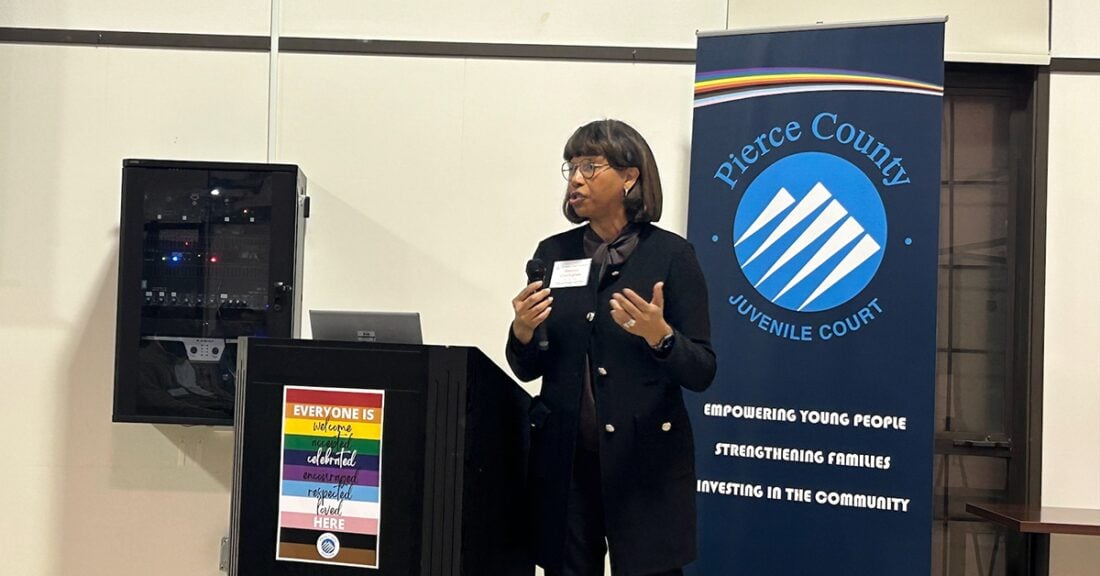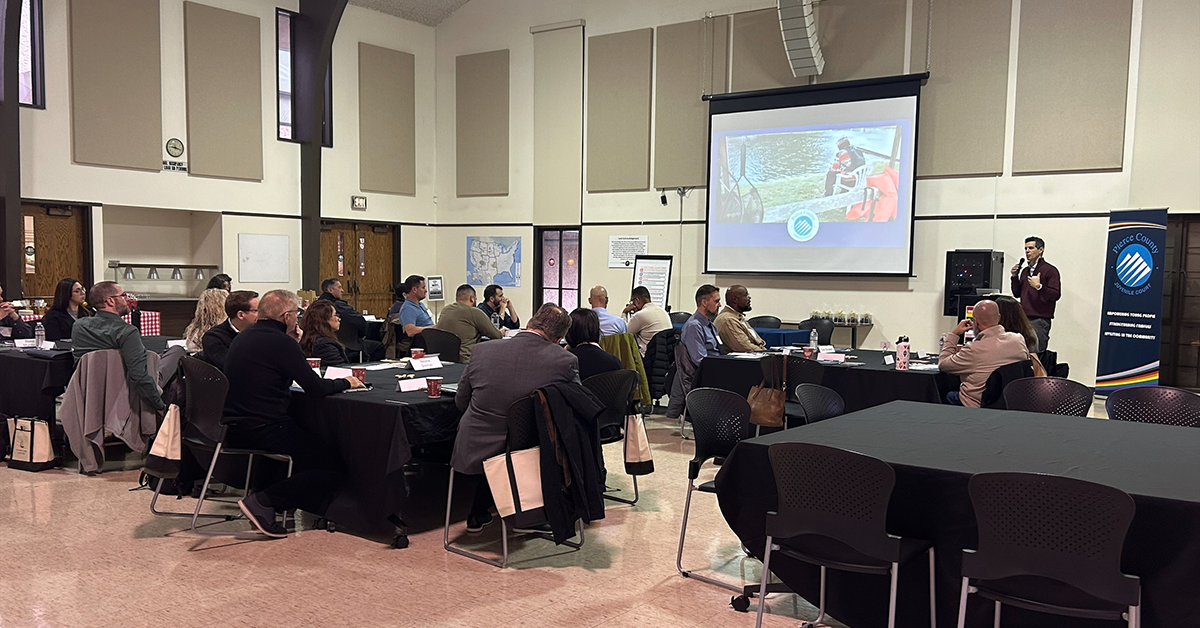Experiencing Probation Transformation in Pierce County, Washington

Veronica Cunningham, executive director, American Probation and Parole Association speaks at the site visit.
Juvenile probation leaders from 15 jurisdictions across the country recently toured the juvenile court in Pierce County, Washington. There, they learned how the court transformed its surveillance-oriented probation approach into a targeted intervention that promotes personal growth, positive behavior change and long-term youth success.
Jointly sponsored by the Annie E. Casey Foundation and the American Probation and Parole Association (APPA), the two-day visit demonstrated the effectiveness of strategies rooted in the Foundation’s vision for transforming juvenile probation. The probation leaders observed what is possible when youth justice systems build strong community partnerships and maximize connections and opportunities for young people to become successful adults.
“The visit to Pierce County Juvenile Court,” said Casey Foundation Senior Associate Opal West, “was both a learning experience for the participants and an opportunity for them to reflect on elements of probation transformation they can implement in their own jurisdictions.”
Walking and Talking Data
The visit began with an overview of the county, the second most populous in the state and home to Tacoma. A Transformation Journey Walk followed — the striking visual presentation highlighted every step of the court’s progress in reforming its juvenile justice policies and practices. Emphasizing the collection and use of data, the presentation included a chronology of Pierce County’s key interventions, including:
- Juvenile Detention Alternatives Initiative (2004);
- Probation Transformation (2016); and
- data showing lower daily detention populations and reductions in racial disparities.
“It was impressive to see Pierce County’s data and [its] data charts, which we don’t have,” said Kelly Gray, chief probation officer with Metropolitan Nashville and Davidson County Juvenile Court. “They’re telling their story. We need to be able to tell ours in a public platform, and we’re working on that.”
After the data walk, the visitors toured the courthouse, seeing firsthand how the vision of probation transformation was embedded throughout the department. Informal conversations with Pierce County staff revealed a collective commitment to the overall goal of ensuring that all the county’s young people thrive in healthy homes and feel connected to their communities.
“As we moved through the building, there was a tangible sense of a complete culture shift for the whole department,” said Derek Getic, executive director of Supervision Services with the Maryland Department of Juvenile Services. “It’s not just a top-down leadership directive. There’s buy-in from the staff. I couldn’t have picked up any of that from a virtual meeting or video.”
Core Principles of Youth Probation
The visit to Pierce County included a deep dive into the 10 core principles of youth probation, based on a recent APPA call to action.

“After the visit, I scheduled two days of training with my probation staff focused exclusively on the 10 core principles,” said Gray. “We’re not going to rush through them. We’re going to make sure everybody’s comfortable with them and really understands them.”
Central to Pierce County’s probation transformation strategy is its commitment to APPA’s seventh core principle: serving as a bridge to community opportunities and connections. This approach emphasizes the importance of strong relationships with community partners who help design and provide positive youth development services. The impact of these partnerships inspired many visiting probation leaders, including Cory Burgess, chief juvenile probation officer for Travis County, Texas.
Determined to deepen his department’s relationships with community partners, Burgess said, “Community-based programming is the most important thing for me. It’s something we will be looking to implement in Travis County.”
Feedback From Families and Youth
Engaging with people who have experience with the justice system is a critical component of probation transformation. The visitors to Pierce County met with members of the juvenile court’s Family Council, nine parent caregivers and three young adults with justice system experience. Derek Getic was one of many probation leaders who noted Pierce County’s receptivity to feedback from kids and families.
“We can ask families what they need and want to get young people back on track, and we can include that in our recommendations to the court,” said Getic. “These are things we can do without a policy directive or law change and have been initiated since my return from Pierce County.”
Visiting probation leaders also learned how Pierce County’s approach to diversion lowers caseloads and enables more effective interventions for youth assessed as low risk. “The diversion program was extremely impressive,” said Gray. “We have a diversion program, and I was excited to get a different perspective.”
Pierce County Juvenile Probation Leadership
Pierce County’s probation transformation is driven by TJ Bohl, juvenile court administrator, and Kevin Williams, probation services manager — both alumni of Casey’s Juvenile Justice Applied Leadership Network. Their leadership, along with strong court staff support and community engagement, provided visiting probation leaders with an eye-opening experience.
“I’ve attended a lot of national and state-level conferences, and this was one of the best opportunities for hands-on learning and networking with peers,” said Burgess. “I would love to take my whole executive team and staff to Pierce County to show them…what we can do to improve our system.”
Learn insights from young people and families who have experienced youth probation






